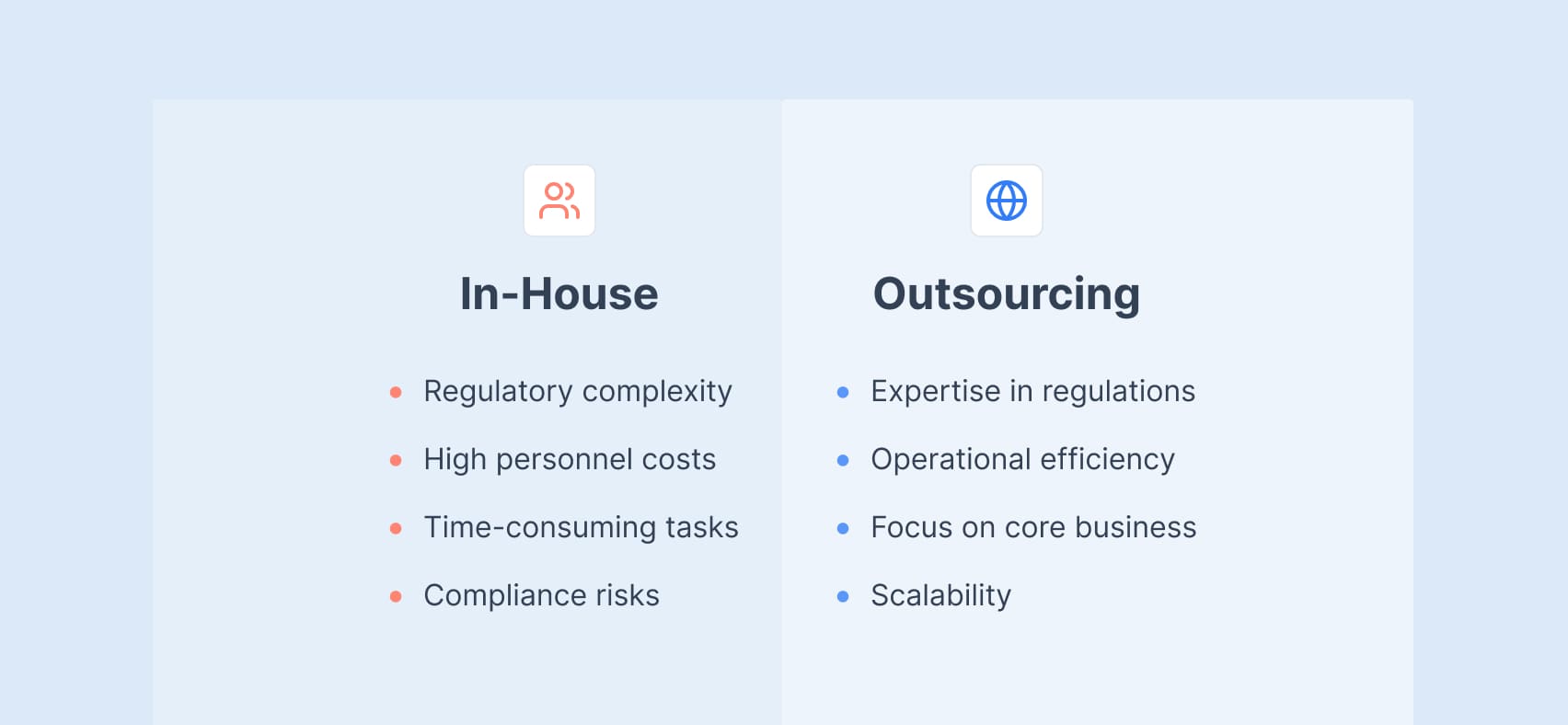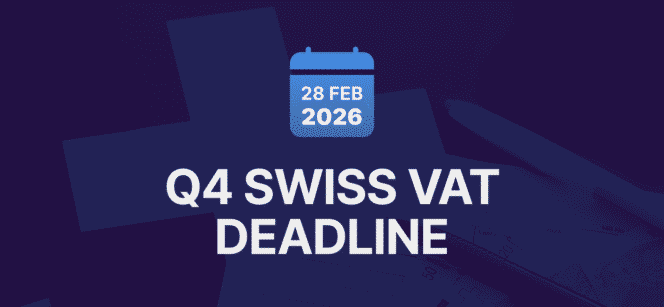Why outsourcing your Swiss payroll and accounting makes sense
For any business owner or manager in Switzerland, the administrative workload can feel immense. The day-to-day demands of running a company, driving growth, and managing a team are significant.

Layered on top of this is a complex and uniquely demanding regulatory landscape for payroll and accounting. While many businesses default to managing these functions in-house, a growing number are discovering a more strategic approach: outsourcing.
This isn’t merely about offloading tasks. It’s about making a crucial investment in compliance, efficiency, and the long-term, sustainable growth of your business. In an environment as intricate as Switzerland’s, outsourcing your financial administration is not a confession that you can’t handle it, but a declaration that your time is better spent on what you do best—running your business. This article explores why outsourcing your Swiss payroll and accounting is a strategic decision that makes profound sense.
The core challenges of in-house management in Switzerland
Managing payroll and accounting internally in Switzerland is not for the faint of heart. It requires a level of specialised knowledge that few entrepreneurs or managers possess. The complexities are numerous and the risks of non-compliance are high.
The intricacies of Swiss payroll
At first glance, payroll seems straightforward: you pay your employees. In Switzerland, however, the process is a labyrinth of federal laws, cantonal variations, and industry-specific rules.
- Navigating Cantonal Differences: Switzerland’s 26 cantons have significant autonomy, leading to a patchwork of regulations. Tax rates, social security deductions, and public holidays can differ from one canton to another. For a business with employees in Vaud and Zurich, for example, payroll calculations will not be identical.
- L-GAV Compliance: Many Swiss industries are governed by Collective Bargaining Agreements, known as Gesamtarbeitsverträge (GAV). These agreements set minimum wages, working hours, and holiday entitlements for an entire sector. Failing to adhere to the specific GAV for your industry can lead to significant penalties.
- Weaving Through the Three Pillars and Tax Obligations: The “Three Pillar” social security model (AHV/AVS, IV/AI, EO, and BVG/LPP) transforms every payslip into a complex calculation. Furthermore, for businesses employing international talent, withholding tax, or Quellensteuer, adds another layer of complexity, requiring the company to act as an agent for cantonal tax authorities. Mistakes in applying the correct tax tariff codes can lead directly to compliance breaches.
The demands of Swiss accounting
Beyond payroll, the general accounting function in Switzerland presents its own set of demanding challenges.
- Adhering to the Swiss Code of Obligations (CO): This is the cornerstone of Swiss accounting law. The CO dictates how a company must maintain its books, mandating full, double-entry bookkeeping for most companies and the preparation of annual financial statements conforming to specific principles.
- Managing Complex VAT/MWST Rules: Value Added Tax (Mehrwertsteuer, MWST/TVA) in Switzerland is complex. Businesses with a taxable turnover exceeding CHF 100,000 per year must register for and charge VAT. Correctly applying the standard and reduced rates, especially for cross-border services, is crucial.
- Keeping Up with Frequent Regulatory Updates: The Swiss legal framework is constantly evolving. Tax laws, social security contributions, and accounting standards are subject to change, requiring continuous learning and adaptation.
The high cost of qualified personnel
Even if a business decides to tackle these challenges, it faces one final obstacle: sourcing and retaining talent. The average annual salary for a qualified accountant in Switzerland can range from CHF 75,000 to CHF 85,000, not including social security contributions and other costs. This represents a major financial commitment for small and medium-sized enterprises (SMEs).
The strategic benefits of outsourcing Swiss payroll and accounting
Given the challenges, turning to a specialised provider is a logical and powerful strategic move. The benefits extend far beyond simple convenience.
Key benefits of outsourcing
- Compliance and Risk Mitigation: This is the most critical advantage. An expert provider lives and breathes Swiss regulations. They know the nuances of every canton and stay current with all legal changes, effectively transferring the risk of non-compliance from your shoulders to theirs.
- Efficiency and Time Savings: Outsourcing liberates your team’s time. It allows your internal resources, including yourself, to move away from administrative chores and refocus on core business activities: strategy, innovation, customer service, and growth.
- Access to Specialised Expertise: A professional firm has a team of specialists who can manage complex cases (like cross-border commuters or unusual compensation structures) with an efficiency and accuracy an in-house generalist cannot match.
- Enhanced Financial Insights: Good accounting isn’t just about fulfilling legal requirements; it’s about generating actionable intelligence. An outsourced partner can transform your raw data into clear, insightful financial reports, providing a solid foundation for informed, strategic decision-making.
- Scalability: As your business grows, so do your accounting needs. An outsourced service scales with you effortlessly, handling increased complexity and volume without any disruption to your operations.
How to choose the right outsourcing partner in Switzerland
Selecting a partner to handle your sensitive financial data is a significant decision. Here is a checklist of essential criteria to consider:
- Proven Expertise in Swiss Regulations: Your partner must demonstrate deep, specific knowledge of the Swiss Code of Obligations, cantonal tax laws, social security systems, and VAT/MWST rules.
- Robust Data Security Protocols: Ensure the provider adheres to the stringent requirements of the Swiss Federal Act on Data Protection (FADP/DSG). All data should be handled on secure, encrypted platforms, preferably hosted in Switzerland.
- Use of Modern Digital Tools: The best partners leverage technology. Look for firms that use modern, cloud-based accounting software that can offer you real-time access to your financial data.
- Clear and Proactive Communication: Your partner should be a proactive advisor, not a passive bookkeeper. They should be easy to reach, communicate clearly, and alert you to potential issues or opportunities.
Conclusion: a strategic investment in your business’s future
In the demanding Swiss business environment, success is built on focus and stability. The complexities of in-house payroll and accounting represent a significant distraction and a source of unnecessary risk.
Outsourcing these functions to a specialised Swiss provider is far more than a cost-cutting exercise. It is a strategic investment in the very foundation of your business. It guarantees compliance, enhances operational efficiency, provides access to invaluable expertise, and delivers the financial clarity needed for smart decisions. By freeing yourself from the administrative burden, you empower your business to concentrate on its core mission, secure in the knowledge that its financial backbone is managed with professional precision.




